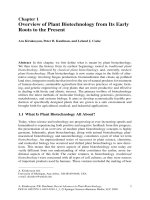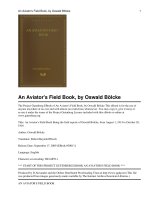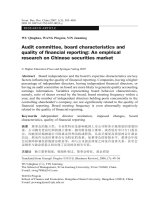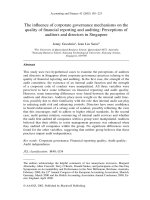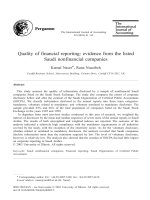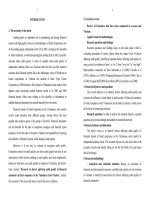Summary of PhD thesis: Transition of financial statements from Vietnamese accounting standard to international financial reporting standard - Experiental study for Vietnamese companies
Bạn đang xem bản rút gọn của tài liệu. Xem và tải ngay bản đầy đủ của tài liệu tại đây (661.42 KB, 32 trang )
MINISTRY OF EDUCATION AND TRAINING
UNIVERSITY OF ECONOMICS HO CHI MINH CITY
-------------By
NGUYEN NGOC HIEP
TRANSITION OF FINANCIAL STATEMENTS FROM
VIETNAMESE ACCOUNTING STANDARD TO
INTERNATIONAL FINANCIAL REPORTING
STANDARD _ EXPERIENTAL STUDY FOR
VIETNAMESE COMPANIES
Major: Accounting
Code : 8340301
SUMMARY OF PHD THESIS
HO CHI MINH CITY– 2018
Thesis is prepared at: University of Economics Ho Chi Minh
City
Professional advisor:
1. Asso.Prof., PhD Ha Xuan Thach
2. Asso.Prof., PhD Bui Van Duong
Critic 1:
Critic 2:
Critic 3:
The thesis will be presented to the Thesis committee
at
At …, the day month year
The thesis can be found in Library
1
INTRODUCTION
1.
Reseach ideal
Vietnam has become an official member of the World Trade
Organization (WTO). Investment and capital activities in the capital
market and securities market attract more and more foreign investors.
To attract capital from foreign investors, Vietnamese companies will
list their stocks on the International stock exchange. One of conditions
for listing stocks on the International stock exchange is to prepare
financial statements in accordance with International Financial
Reporting Standard (IFRS). In addition, with the progress of
International economic integration, the level of competition among
companies is increasing, more and more Vietnamese companies seek to
increase exporting and set up their operations abroad. Therefore, their
financial statements must be prepared in accordance with the IFRS.
Accompanying with the process of International accounting
convergence in 2020 and the vision 2030 in Vietnam, Vietnamese
companies will need to transit their financial statements from
Vietnamese Accounting Standard (VAS) to IFRS to meet the
requirements of this convergence.
Derived from the need of economic integration, from the trend
of convergence of International accounting in Vietnam and from
difficulties and challenges faced by Vietnamese companies in
transition of financial statements from VAS to IFRS and to help
Vietnamese companies have more favorable in transition of financial
statements to IFRS. The topic of this thesis is “Transition of
financial statements from Vietnamese Accounting Standard to
International Financial Reporting Standard_Experimental study
of Vietnamese companies”
2
2.
Reseach objectives
The general objective of this thesis is to develop a framework for
transition of financial statements from Vietnamese Accounting Standard
(VAS) to Intrenational Financial Reporting Standard (IFRS) for
Vietnamese companies. It is necessary to identify and measure factors
that affect in transition of IFRS financial statements in the conditions of
economic, political, cultural and social of Vietnam. This will help to
find out difficulties, challenges in transition of financial statements to
IFRS. In order to solve the general objective, the thesis needs to address
two main objectives: 1/ Develop a framework for transition of financial
statements from VAS to IFRS. 2/ Identify and measure factors that
affect transitions of IFRS financial statements.
3.
Research questions
There are four questions to resolve the two main research
objectives: (1) What are key differences of each items on financial
statements between VAS / Vietnamese Circulars and IAS/IFRS?; (2)
What are methods of transition
financial statements to IFRS in
Vietnam, currently? What are difficulities and challenges of IFRS
transition?; (3) What are factors that affect of transition financial
statements from VAS to IFRS? (4) How does each factor affect
transition of financial statements form VAS to IFRS?.
4.
Research subjects and scopes
Reseach subjects:
The key differences of each item on financial statements between
VAS / Vietnamese Circulars and IAS/IFRS.
Status of transition financial statements from VAS to IFRS of
Vietnames companies.
Factors that affect transition of financial statements from VAS
3
to IFRS.
Reseach scopes:
Vietnamese companies are transitioning and preparing to
transit their financial statements from VAS to IFRS
Financial statements of Vietnamese companies (included
transited IFRS financial statements) of the period 2010 to 2015.
5.
Reseach methodology
The author uses mixture of qualitative and quantitative
methods in this thesis. The research process of thesis as below
4
Research problems
-
Trasition of financial statements from VAS to IFRS
-
Research objectives
Developing a framework for transition of financial statements from VAS to IFRS
Identify and measure factors that affect transition of financial statements from VAS to IFRS
Theoretical basis
-
VAS, Vietnmaese Circulars, Vietnamese accounting laws; IAS / IFRS and published reseachs
Qualitative research
-
Collecting data regarding research objectives, financial statements; case study research
and in-depth
interviews
-
Analyze, discuss the results and compare to theoretical basis
-
Identify factors that affect transition of financial statements form VAS to IFRS, based on the results for
quantitative research.
Comparative
Case study
In-depth
research
research
Interview
Comparison of
significant
differences
Status of
that
variable
affect
(ii)
Develop questionnaries
of Vietnamese
transition
each item on
companies,
financial
(iii)
Collect data
financial
Transition
statements from
(iv)
Process data
statement
methods,
VAS to IFRS
(v)
Analyze data
between VAS /
difficulities and
Vietnamse
challenges (Q2)
circulars
of
Scale building and
descreptions the observed
Idnetify factors
transition to IFRS
of
Quantitative research
(i)
measure the affect of each
(Q3)
factor on transition of financial
statements from VAS to IFRS
and
(Q4)
IAS/IFRS (Q1)
Developing a framework for transition of Financial
Identify and measure factors that affect transition of financial
statements from VAS to IFRS (Objective 1)
statements from VAS to IFRS (Objective 2)
Recommendation
Based on the results of qualitative and quantitative research to recommend policies that impact and support by
the Vietnamese Government, companies, training institutions to help Vietnamese companies have more
favorable in transition of financial statements from VAS to IFRS.
Reseach Processes of Thesis
5
6. New contributes of thesis
Theoretical implications:
Developing a framework for transition of financial
statements from Vietnamese Accounting Standard to International
Financial Reporting Standard with general principles that are
scientifically based, helping all types of Vietnamese companies can
apply.
Building a model by factors that affect transition financial
statements to IFRS of Vietnamese companies in the conditions of
economic, political, cultural and social of Vietnam and contribute
to International theoretical system on factors that affect of
transition financial statements from national accounting standards
to International financial reporting standard.
Empirical implications:
Based on the results of thesis, The Vietnamese Ministry of
Finance and the State Securities Commission can orient to develop
a framework for transition of financial statements from Vietnamese
Accounting
Standard
to
International
Financial
Reporting
Standard, to develop guidance on transition financial statements to
IFRS; Vietnamese companies rely on the framework of transition
financial statement to IFRS of this thesis to plan for their transition
of financial statements from VAS to IFRS at their companies;
Training institutions and Vietnamese Universities develop training
programs on transition of financial statements to IFRS in order to
improve IFRS knowledges for accountants in Vietnam, helping
Vietnamese companies have more favorable in transition of
financial statement sfrom VAS to IFRS.
6
Based on the results of identify and measurable five
factors(Economic integration, Legal system, Cultural environment,
Support of company’s Manager and Educational of accountant)
that affect in transition of financial statement from VAS to IFRS,
author recommends policies that impact and support by Ministry of
Finance, State Securities Commission, training institutions as well
as management implications of Vietnamese companies, these will
help more favorable in transition of financial statements from VAS
to IFRS for Vietnamese companies.
7.
Thesis structure
The thesis is divided in five chapters. Introduction; Chapter 1–
Literature review; Chapter 2–Theoretical basis; Chapter 3–Reseach
method, Results and discussion on developing a framework for
transition of financial statements from VAS to IFRS; Chapter 4–
Research method, Results and discussion on indentification and
measurable factors that affect transition of financial statements from
VAS to IFRS; Chapter 5–Conclusion and Recommendation.
CHAPTER 1 LITERATURE REVIEW
1.1
Reseaches in the world
1.1.1
Reseaches on transition of financial statements from
National accounting standards to IFRS
1.1.1.1
Reseaches on differences between national accounting
standards and IFRS
Reseached in this field in countries of the EU by Danuta
Krzywda & Marek Schroeder (2007); Devalle & ctg (2010); Struharo
& Katerina (2010); Beuselinck & Ctg (2010); Stamatios Dritsas &
ctg (2014); Michael E. Bradbury & ctg (2017). The result of these
7
showed that there are differences between national accounting
standards and IFRS.
1.1.1.2
Reseaches on the first time adopt IFRS and
IFRS’s
regulations
The differences between national accounting standards and
IFRS are affected to the first time adopt IFRS, companies must abide
IFRS’s regulations and rules (Eva K. Jermakowicz & ctg, 2007),
Demaria & Dominique (2008) in France; Soderstrom & Sun (2013).
Saidu & Dauda (2014) in Nigeria; Eva K. Jermakowicz & ctg (2014)
in United States.
1.1.1.3
Reseaches on affecting financial statements of transition
and adopt IFRS
Reseaches in countries of the EU by Sally Aisbitt (2006);
Susana Callao Gaston & ctg (2010); Achilleas Psaroulis (2011);
Ioannis Tsalavoutas & ctg (2012); Vera Palea (2012); Irina-Doinaba
(2012); Michela Cordazzo (2013); Helena Vojakova (2015). ChungHao Hsu & ctg (2013) in Taiwan; (Shu-hsing Wu, 2014; Johanna
Forsberg & Johanna Ojala, 2014) in China; Bhanu Sireesha (2015) in
India; Sylwia Gornik-Tomaszewski (2014) in the United States;
Muhammad Nurul Houqe & ctg (2017) in Newzealand. The results
showed that IFRS transition affected companies’s financial
statements results.
1.1.1.4
Reseaches on benefits and challenges in transition and
adopt IFRS
Beside the benefits of IFRS transition, there are many
difficulties and challenges for oprations of companies in transition
and adopt IFRS, Jermakowicz (2004) in Belgium; (Weienberger &
8
ctg, 2004; Mary E Barth, 2008); Ormrod & Taylor (2004) in
England; Costin A. Istrate (2015) in Romania; Kavitha (2014) in
India; (Hlaciuc Elena & ctg, 2009; Murphy Smith, 2015) in United
States.
1.1.2
Reseaches on factors that affect transition and adopt
IFRS
1.1.2.1
External factors
Economic intergration
Reseached by (Young & Guenther, 2003; Spyros Baralexis,
2004) in Greek; Philip Brown & Ann Tarca (2005) in France ,
Germany & England ; Murphy & Bruce (2007); Leuz & Hail (2006);
Christopher S.Armstrong & ctg (2008); Francis & Hannah (2010);
Chen Huifa & ctg (2010) 15 countries of the EU; Abdulkadir
Madawaki (2012) in developing countries, Nigeria; Irvine & Lucas
(2006) in Middle East; Aggarwal & ctg (2004) in United States; Kim
M. Shima & David C. Yang (2012); Michael Neel & ctg (2017)
countries adopted IFRS.
Legal system
Reseached by Adhikari & Tondkar (1992); Lei Cai & ctg
(2009); Doupnik & Salter (1995); Jaggi & Low (2000); Christopher
Nobes & Robert Parker (1995); Danuta Krzywda & ctg (2007);
Elisavet Mantzari & ctg (2017) in countries of the EU. (Abdulkadir
Madawaki, 2012; Mohamed Abulgasem Zakari, 2014; Shigufta Hena
Uzma & ctg (2016) in developing countries; in many countries
adopted IFRS by Kim M.Shima & ctg (2012).
9
Cultural enviroment
Reseached in this field by Zarzeski Marilyn Taylor (1996);
Stulz & ctg (2003); Karahanna & ctg (2005); Sally Aisbitt (2006) in
England; Demaria & ctg, 2008) in France; Kim M. Shima & David
C. Yang (2012); Mohamed Abulgasem Zakari (2014) in Libya;
Sidney J. Gray & ctg (2015) in the EU.
1.1.2.2
Internal factors
Support of company’s manager
Reseached in this filed by Weibenberger & ctg (2004);
Vedran Capkun & ctg (2008); Van Tendeloo & ctg (2005); Callao &
Jarne (2010); Top Robert Teller (2009); Hans B. Christensen & Ctg
(2015) in the EU. (Evans O.N.D. Ocansey, 2014) in developing
countries, Martin & Donna (2003) in United States.
Education of accountant
Reseached on this filed by (Nobes & Parker, 1995); Kim M.
Shima & ctg (2012); Mohamed Abulgasem Zakari (2014); Costel
Istratea (2015).
1.2
Reseaches in Viet Nam
Reseached on differences between VAS and IAS / IFRS
(Tang Thi Thanh Thuy, 2009; Nguyen Thi Phuong Thao, 2010;
Nguyen Thi Kim Oanh, 2010; Tran Quoc Thinh, 2013; Le Vu Tuong
Vy (2017).
The fisrt time adopt IFRS and affecting IFRS to financial
statements: Le Thi Kieu (2013), Đinh Minh Tuan (2013) and Nguyen
Van Liem (2015).
10
Duc Hong Thi Phan, Mascitelli & Barut (2014): “Perceived
toward adopt IFRS”; Le Vu Truong & Đinh Minh Tuan
(2016):“Opportunities and challenges of adopting IFRS in VietNam”.
Reseached on the factor that affect transition and adopt IFRS
in Viet Nam by Nguyen Thi Thu Phương (2014); Ha Xuan Thach &
Le Tran Hanh Phuong (2017), micro factors that affect adopting
IFRS in Viet Nam and Do Duc Tai & Tran Thi Du (2017) cultural
factor affected the differences financial statements prepared
according VAS and IFRS.
1.3
1.3.1
Results and limitation of previous reseaches
Transition
of
financial
statements
from
national
accounting standards to IFRS
+ There are differences between national accounting
standards / VAS and IAS/ IFRS, depended on the difference level of
two accounting standards, these differences will affect IFRS
transition on items of financial statements, overview of financial
statements and informations on financial statements.
+ The difficulities of the first time adopt IFRS are affected
by the financial statements prepared according national accounting
standard. It is necessary to comply the form, framework, policy and
reporting requirements of IFRS.
+ It’s significant affecting results of financial statements
before and after adopt IFRS.
+ Transition and adopting IFRS has many benefits, these
benefits are the key motivation for adopting IFRS. However, it has
many difficulities and challenges for companies for thier IFRS
projects.
11
1.3.2
The factors that affect transition and adopt IFRS
Combined published researches of the world and Vietnam,
there are five main factors discovered in this thesis
External factors:
Economic intergation is one of the five factors that affect
transition and adopt IFRS, IFRS financial statements help companies
easier to attract foreign investors and this is a condition to list their
shares or bonds on the International stock market.
Legal system is one of factors that affect IFRS transition in
the developing countries due to there are differences between
National accounting standards and IFRS. It is needed to develop a
corresponding accounting system and accounting documents to guide
adopting IFRS, it also needs to prepare IFRS financial statements per
required by the government or financial institutions.
Cultural environment affects transition and adopt IFRS due
to the influence of habit. It is needed to develop appropriate
regulatory systems to address national cultural issues. The countries
with low risk culture may attract to adopt IFRS, national cultural also
affects the eaning management when companies adopt IFRS.
Internal factors:
Support of company’s manager: researches showed that the
important role of company’s manager to made decision on transition
and adopt IFRS, increasing supported adopt IFRS by managers in the
EU.
Education of accountant, the previous researches said that
companies need to increase IFRS training for accountants and
12
managements, with IFRS knowledge helps IFRS transit; it’s lack
IFRS professional accountants in developing countries.
1.3.3
Limitation of previous researches and the aim of this
thesis
Limitation of previous reseaches
Regarding transition of financial statements to IFRS:
+ The published researches of the world and Vietnam are
mainly researched on adopting IFRS.
+ There is no research on developing a framework for
transition of financial statements from VAS to IFRS.
Regarding factors that affect transition and adopt IFRS:
+ The previous researches focused on external factors that
affect adopting IFRS, researched in the developed countries, it’s
differences economic, political, cultural and social with Vietnam.
+ Some previous researches use qualititave reseach without
measuring the impact of factors in IFRS transition.
The aim of this thesis
+ Developing a framework for transition of financial
statements from VAS to IFRS with general principles that are
scientifically based, helping all types of Vietnamese companies can
apply.
+ The results of thesis on identify and measurable five factors
(Economic integration, Legal system, Cultural environment, Support
of company’s Manager and Educational of accountant) that affect in
transition of financial statement from VAS to IFRS, thesis
recommend policies that impact and support by Vietnamese state
13
management
departments,
training
institutions
as
well
as
management implications of Vietnamese companies, these will help
more favorable in transition of financial statements from VAS to
IFRS.
1.4 Conclusion
CHAPTER 2 THEORTICAL BASIS
2.1
Overview of Vietnames accounting standard
The thesis presented the development processes of the 26
VASs and the Common standard (VAS1) and the Presentation of
financial statement standard (VAS 21).
2.2
Overview of IAS / IFRS
The development processes of IAS and IFRS, IASB
framework and the Presentation of financial statement standard
(IAS1).
2.3
Overview differential between VAS/ Vietnamese Circulars
and IAS/ IFRS
The recently issued circulars regarding accounting closer the
IFRS but there are differences between the VAS / Circular
200/2014/TT-BTC
/
Circular
210/2014/TT-BTC
/
Circular
49/2014/TT-NHNN and IAS/ IFRS.
2.4
Overview of IFRS 1
General objectives, rules and user IFRS1 are very
important for companies that transit and apply IFRS .
2.5
Transition
of
financial
statements
from
national
acoounting standards to IFRS and affecting of IFRS
transition
14
Transition of financial statements from national accounting
standard to IFRS in many countries. The transition to IFRS has many
benefits for companies, the impact of IFRS transition depend on the
differences between each country’s accounting standard and IAS/
IFRS.
2.6
Foundation theories and applied for this thesis
Author used five foundation theories for this thesis:
Usefulness theory; Theory of culture’s consequences; Theory of
legitimacy; Theory of competition and Theory of planned behavior TPB
2.7
Factors that affect transition of financial statements form
National
accounting
standards
to
IFRS
from
the
foundation theories
Table 2.1: Summary of factors that affect IFRS transition from
the foundation theories
STT
1
Factor
Economic integration
Foundation theory
Usefulness theory
Theory of legitimacy
Theoryof competition
2
Legal system
Theory of legitimacy
3
Cultural enviroment
Theory of planned behavior
4
Support of company’s
Usefulness theory
manager
Theoryof competition Theory
of planned behavior
5
Education of accountant
Source: Summary by author
Theory of planned behavior
15
2.8 Conclusion chapter 2
CHAPTER 3 RESEARCH METHOD, RESULT AND
DISCUSSION ON DEVELOPING A FRAME WORK FOR
TRANSITION OF FINANCIAL STATEMENTS FROM
VIETNAMESE ACCOUNTING STANDARD TO
INTERNATIONAL FINANCIAL ACCOUNTING STANDARD
3.1
Comparative research, results and discussions
The results of comparative research showed that till now, its
missed some VASs is equivalent to some IAS/ IFRSs; There are
many differences in each standard between VAS and IAS / IFRS.
The results of comparative research of each item analysis in
the financial statements between VAS/ Circular 200-2014/TT-BTC /
Circular
210/2014/TT-BTC/
Circular
49/2014/TT-NHNN
and
IAS/IFRS showed that there are many differences in items of
financial statements between the two accounting standards. The
results of differences in items of financial statements will serve as a
theoretical basis to develop a framework for transition of financial
statements from VAS to IFRS.
3.2
Case study research, results and discussions
Author selected two companies, listed on the Hochiminh
Stock Exchange for the case study research (1) ABC Securities
Corporation. ABC uses manual transition method to transit their
financial statements from VAS to IFRS. IFRS transited financial
statements are prepared at the year end after having VAS audited
reports, supporting by senior auditors of Ernst & Young combined
with company’s chief accountant and (2) XYZ Commercial Bank.
XYZ Bank uses automatic transition method to transit their
16
financial statements from VAS to IFRS, running parallel two
financing reporting systems (VAS & IFRS). IFRS financial
statements are prepared to provide for its foreign lender, regarding its
loan agreements. IFRS reports are not published disclosed, the Board
and Chief Finance officer of tow companies required the author not
to disclose specific name of them in this thesis.
The results of case studies showed that Vietnamese
companies transit their financial statements from VAS to IFRS in two
main transition methods: Manual and Automatic transition. The case
studies also showed
the difficulties and challenges faced by
Vietnamese companies in the IFRS transition as there are significant
differences between VAS and IAS / IFRS; lack of IFRS knowledge
of accountants; IFRS’s forms, rules differ from VAS’s; Cost of
preparing IFRS may exceed the benefits.
Based on the results of the case studies, author expects that
economic integration (IFRS financial statements are required by
foreign investors, foreign lenders…), The legal system (differences in
each item on the financial statement between VAS / Circular 2002014 / TT-BTC / Circular 210/2014 / TT-BTC / Circular 49/2014 /
TT-NHNN and IAS / IFRS); Education of accountant (lacking of
IFRS knowledge of accountants in Vietnamese companies) and
Support of company’s manager (management decision and support in
human resources and finance for IFRS, costs of IFRS transition..) are
the factors that affect the IFRS transition.
3.3
Developing a framework for transition of financial
statements from VAS to IFRS
17
3.3.1
Overview the framework for transition of financial
statements from VAS to IFRS
Overview framework for transition of financial statements
from VAS to IFRS (from preparation plan to the specific contents of
transition procedures) including 6 steps Chart 3.3 below and
Appendix 3.20 of the thesis: Details of transition financial statements
from VAS to IFRS.
18
1. Prepare transition
conversion
1.Prepare
Transition
-
Reasons for transition
-
Time for pre-transit
2. Assess impacts of
transition
3. Establish a transition
4 Transition plan
project
5 Transition
6. Monitor and
Implement
sustain
Implemen
t
Opportunities and challenges of transition
Accounting, tax and reporting
2.Assess
IT System
Conversio
impacts of
Business processes
transition
Peoples and changes
n
Implemen
tConversi
Objective Overview: set up a steering committee; structure of members of project; roles and
3.Establish a
transition
on
responsibilities .Technical team; conversion team, managed team; IFRS advisors
project
4.
-
Stage 1: objective/plan
-
Stage 2: Design/ build
-
Stage 3: Implement/ review
Implemen
t
Transition
plan
Stage 1: Objective/ Plan . Objectives: analyze transition impacts and discloses; Analyze transition impacts on reporting ‘s requires ; Analyze transition impacts on tax; Assess transition
impacts on systems and procedures ; Analyze transition impacts on peoples and changes ; Assess company readiness for transition project ; Reporting transition impacts on people and
changes ; Reporting transition impacts on company ’s businesses; transition plan
5 Transition
Implement
Stage 2: Design /Build: Objectives; Job details ; Base on timeframe and progress made under plans (stage 1), collect and completion status of step “ assess”; Define first date of transition;
Select accounting and reporting (considering various transition methods of opening balances on the financial position statement); Draft accounting policies , accounting books and manual
accounting;. Assess and identify requirements for systems and processes; Consider effects of tax and tax strategies ; Opportunity for integrating external and internal reporting processes; Design
change system, training and development implement plan
6.Monitor and
sustain
Stage 3: Implement/ Review: Objectives ; Job details; Assumption/Build/,testing and process ; Test IT solutions; Implement solutions and training ; Data collection sand processes; Prepare
beginning statements of financial position statement and comparable; Prepare IFRS financial statements
Monitor and sustain post
implementation stage of
conversion
19
3.3.2
Manual transition method of financial statements from
VAS to IFRS: 8 steps
Step 1: Identify differences in measurement and presentation
of financial statements
Step 2: Determine the first year of transition, identifying the
years of comparative data required by IFRS1. Recalculate the
beginning of the period at IFRS 1
Step 3: Preparing adjustment entries of difference in impact
measurement in the statement of Balance Sheet and statement
of Profit and loss
Step 4: Combination / Split accounts to present in the Balance
Sheet
Step 5: Combination / Split revenues / expenses to present in
the Profit and loss
Step 6: Transition statement of cashflows
Step 7: Adjusting, supplement the note of financial statements
Step 8: Preparing statement of change owner equity.
3.3.3 Automatic transition of financial statements from VAS to
IFRS
Business activities
Chart 3.4: Overview of information system
Centralized
accounting
(Principles,
tools,
Financial data
warehouse
General
ledgers
Financial
statements
(BS,P&L)
Other reports
( Trial
Balance,..)
Reports from system
1
2
3
Management reports
VAS & IFRS Financial reports
State reports (Tax dept..)
20
Chart 3.5: Overview of accounting data center
GL
Recording principles
warehouse
Centralized accounting
GL &
Consolidatio
n
Business
activities
Accounting
entries
Balancing storages
Post to GL
Chart 3.6: Method uses accounting system and general ledger
system
Treatment method for chart of account
IFRS accounts
General ledger method
VAS accounts
Ghi nhận giá trị theo VAS
xxxxx
11 xxxxx
22 xxxxx
Shared
accounts
(*)
Recording transactions IFRS
Accounts xxxxx
Statement of financial position-IFRS
(*) Shared accounts are not differences in recording between IFRS & VAS
Statement of financial position - VAS
21
3.4
Conclucion chapter 3
CHAPTER
4
RESEARCH
METHOD,
RESULT
AND
DISCUSSION ON INDIFICATION AND MEASUREMENT
FACTORS THAT AFFECT TRANSITION OF FINANCIAL
STATEMENTS
STANDARD
FROM
TO
VIETNAMESE
INTERNATIONAL
ACOCUNTING
FINANCIAL
REPORTING STADARD
4.1
In-depth interview research, results and discussions
Research model proposal
Figure 4.1 : Research model
Economic intergation (HNKT)
Legal system (HTPL)
H1
H2
Transition of financial
H3
Cultural enviroment (MTVH)
statements from VAS to
IFRS (CDBC)
H4
Support of company’s manager (HTQT)
H5
Education of accountant (NVKT)
Develop research hypotheses
H1: International economic integration has positive affect in
transition of financial statement from VAS to IFRS.
H2: Legal system clearly and sufficiency will facilitate
transition of financial statement from VAS to IFRS.
22
H3: Cultural environment has affected transition of financial
statement from VAS to IFRS.
H4: Supporting by company’s Manager has positive affect in
transition of financial statement from VAS to IFRS.
H5: Accountant with good knowledge in IFRS has positive
affect in transition of financial statement from VAS to IFRS.
CDBC: Transition of financial statement from VAS to IFRS
(Dependend variance).
The result of In-depth interview research showed that the
second expert of 12 experts interviewed gave a new factor that affect
in IFRS transition, Information system. However, this new factor just
mentioned by one expert only, furthermore the result of case study
research showed that information system supports for the IFRS
project only, so that this factor is enough to develop in the question
of the quatitative research. Based on the statistical results of author,
all 12 experts agreed the five factors in the proposed research model
of this thesis are Economic integration, Legal system, Cultural
environment, Support of company’s manager and Education of
accountant.
4.2
Quatitative research, results and discussions
4.2.1
The suitable of qutitative research
4.2.2
Research procedures
Respondents: 1/ Chief financial officers / Chief accountants /
Accountants / Senior managers of some Vienamese companies that
transition or preparing to transit their financial statements from VAS
to IFRS and; 2/ Diretors / Senior manager auditors of the Big four
23
audit firms who directly transit or manage the transition IFRS
financial statements for Vietnamese companies.
Survey method: Option1: Sending the questionnaires directly to the
survey subject then collected after their completed; Option 2:
Sending the questionnaires by email. Author sent out 300
observations for the official survey in Y2017, collected 239
observations (79.67%), after cleaning, 11 unsatisfactory and rejected,
228 valid observations were used for the analysis.
4.2.3
Analysis and disucssion results
4.2.3.1
Results of pilot testing
The result analyzed by the Cronbach Alpha, after eliminating
some unsatisfactory variables, the remained 27 variables will be used
for the official survey.
4.2.3.2
Result of official survey
4.2.3.2.1 Description the research data
With the 228 valid observations, the result from the description
the research data showed that 104 accoutants (45,6%) 20 Chief
accounts (8,8 %), 106 Auditors (46,5 %), 18 company’s managers
(7,9 % ).
4.2.3.2.2 Testing reliability of the variables in the data set
The results of the Cronbach Alpha coefficient showed that it’s
above the recommended 0.6. This showed that the research variables
are relevant and reliable. At the same time, all observations for
variables in the model, including both independent variables and
dependent variables, the Correlation coefficient of total variables
